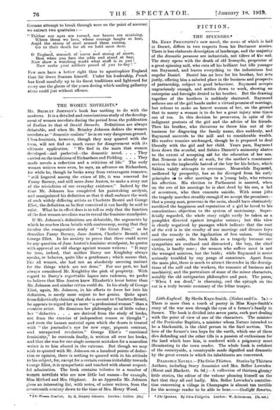THE WOMEN NOVELISTS.• Mn. AMBLE? JOHNSON'S book has nothing to
do with the moderns. It is a detailed and conscientious study of the develop- ment of women novelists during the period from the publication of Eisfina to that of Daniel Derotida. Definitions are always debatable, and when Mr. Brimley Johnson defines the women novelists as " domestic realists " he is on very dangerous ground. lltra-feminists, however, though they may quarrel with the term, will not find so much cause for disagreement with its ultimate application. " We find in the main that women developed—and perfected—the domestic novel. . . . They carried on the traditions of Richardson and Fielding. . . . They snade novels a reflection and a criticism of life." The early women writers were even, he says, an advance on Richardson, for while he, though be broke away from extravagant romance, "still lingered among the crises of life, it was reserved for Fanny Burney, and still more Jane Austen, to make a story out of the trivialities of our everyday existence." Indeed by the time Mr. Johnson has completed his painstaking analysis, awl manipulated his definition so that it shall embrace the work of such widely differing artiste as Charlotte Bronte and George Eliot, the definition as he first conceived it can hardly be said to eiist. What he in effect does is to tell its only that the function of the first women novelists was to reveal the feminine standpoint.
If Mr. Johnson's definitions are debatable, the arguments by which he reaches them bristle with controversy, seeing that they involve the comparative study of " the Great Four," as he describes Fanny Burney, Jane Austen, Charlotte BronCe, and George Eliot. In his anxiety to prove that there could never be any question of Jane Austen's feminine standpoint, he quotes with approval an old charge against women writers : "It may be true, indeed, that neither Darcy nor Knightley always speaks, or behaves, quite like a gentleman ; which means that, like all women, she had not an absolutely unerring instinct for the things which are not done." For our part, we had always considered Mr. Knightley the pink of propriety. With regard to Darcy's regrettable lapses into rudeness, we prefer to believe that Miss Austen knew Elizabeth's lover better than Mr. Johnson and similar critics could do. In his study of George Eliot, again, Mr. Johnson, in his efforts to force her into his definition, is surely most unjust to her genius. Quite apart from didactically claiming that she is second to Charlotte Brenta, he appears to regard her as more "a professional woman" than a creative artist. Ho dismisses her philosophy as of little value ; her "didactics . . . are derived from the study of books, not front the exercise of independent reason or thought " ; and even the human material upon which she draws is treated with " the journalist's eye for now copy, piquant contrast, and unexpected revelation." George Eliot's " emotional femininity," he contends finally, is written all over her books, and that she was for one single moment mistaken for a masculine writer is to him absurd in the extreme. But though we may wish to quarrel with Mr. Johnson on a hundred points of dedue. lion or opinion, there is nothing to quarrel with in his attitude to his subject, for, except for a certain curious irritability towards George Eliot, it is sympathetic and touched with almost respect- ful admiration. Tho book contains tributes to a number of women novelists who are now little but names—for example, Miss Mitford and Mrs. Oliphant. In an Appendix Mr. Johnson gives an interesting list, with notes, of minor writers, from the seventeenth century down to the time of Mrs. Henry Wood.
• 2 he was.. !c.w.o. Its R Brimley Johann. Lonlos : Coffins BIM


































 Previous page
Previous page